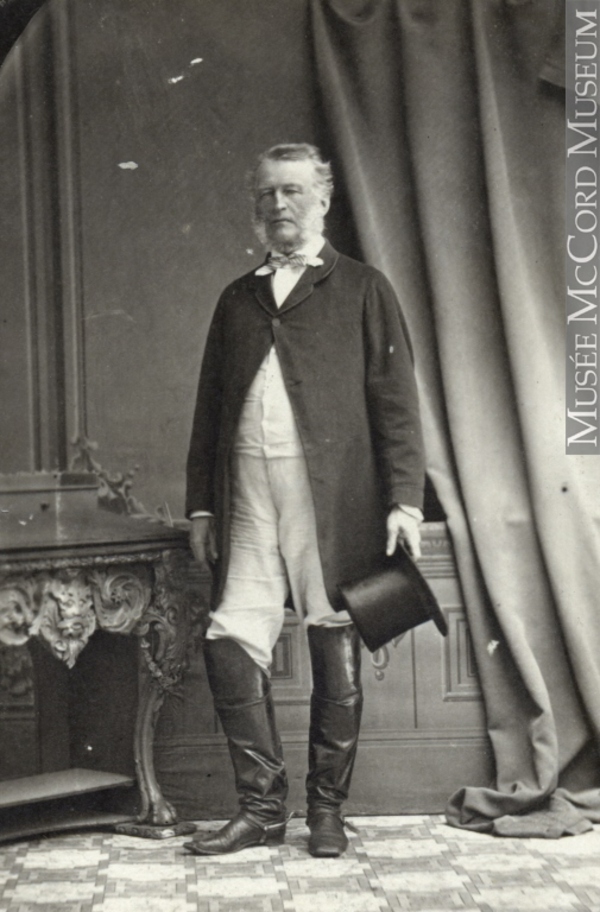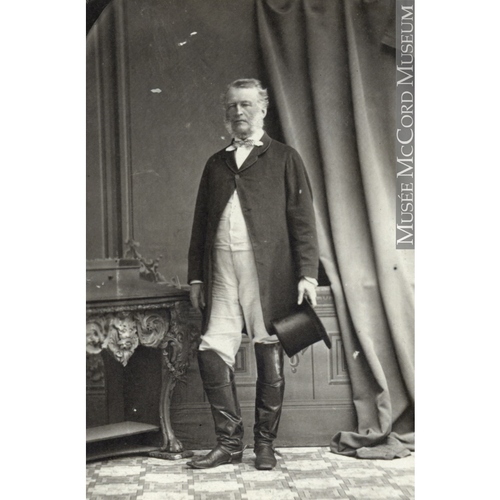
Source: Link
GUGY, BARTHOLOMEW CONRAD AUGUSTUS, soldier, mha, seigneur; b. 6 Nov. 1796 at Trois-Rivières, eldest son of Louis Gugy*, member of the assembly, seigneur, and legislative councillor, and of Juliana O’Connor; d. suddenly on 11 June 1876 at his residence of Darnoc, at Beauport, near Quebec.
A Huguenot by birth, and the son of a Swiss colonel who was a French royalist before entering the service of Great Britain, Bartholomew was educated at the school of the Reverend John Strachan* at Cornwall, and enlisted in the Canadian Fencibles as soon as war was declared in 1812. He fought beside his father, was promoted lieutenant, and distinguished himself at the battle of Châteauguay. He then studied law and was called to the bar on 7 Aug. 1822. He was not long in acquiring a numerous and lucrative clientele, but his subsequent career was above all political and military.
In 1831 Gugy was elected to the assembly for Sherbrooke, and was re-elected until the period of the 1837–38 disturbances. As he was one of the small number of Tories who could express themselves readily in French, he had frequent and stirring verbal bouts with Louis-Joseph Papineau. Gugy fought with supple oratory, using irony, banter, sarcasm, and insolence. He had the knack of finding the best way to exasperate the speaker, and the latter would respond loudly. (According to certain champions of Papineau, it was this same Gugy who was chiefly responsible for the improprieties of language of the Patriotes and their leader.)
In 1837, at the first echo of the revolt, Gugy volunteered for the militia. With the rank of colonel, he led the cavalry at Saint-Charles, and it may have been he who personally seized the “column of liberty” the Patriotes had erected in honour of Papineau, and carried it in triumph (with two subalterns) to Montreal. At Saint-Eustache he again distinguished himself by his enthusiasm. He is said to have led his horse into the church in order to water it at the stoups. He was accused of cruelty, and even of walking knee deep in the blood of French Canadians. But a pamphlet, Attestation de six curés au sujet de la conduite du colonel Gugy en 1837–1838, re-establishes the truth in his favour. Later, having billetted his troops at Saint-Hyacinthe, Gugy stayed at the Dessaulles’ house, where the Papineau children had taken refuge. He gave a wax doll to Ezilda and two picture books to Gustave.
From 22 Nov. 1838 to 2 Jan. 1839, Gugy held the position of police magistrate at Montreal, and on 14 March 1841 he agreed to become adjutant-general of militia for Lower Canada. Until his resignation on 30 June 1846 he was one of the favourite targets of the Liberal party of Louis-Hippolyte La Fontaine*, which accused him of not appointing enough French Canadians to the higher ranks of the militia. After the Union in 1841, Gugy had stood as a Tory candidate in Saint-Maurice County, but had been defeated despite the scrutineer’s efforts on his behalf. In fact, the supporters of his opponent, Joseph-Édouard Turcotte*, had seized the polling booth. He had also been a candidate in Sherbrooke but was defeated by Edward Hale. In 1848 he was elected by acclamation in the town of Sherbrooke. In the house, Gugy voted regularly against La Fontaine’s ministry, and during the famous debate on the rebellion losses bill, Gugy, with Sir Allan Napier MacNab*, was the principal leader of the opposition. His speeches contributed not a little to the almost electric tension that finally exploded during the riots following the burning of the parliament building in 1849. He reacted with his customary spirit and impetuosity, and began to fight with the very people who had been aroused by his speeches. During the night the parliament was set on fire, he seized several of the agitators to stop them from setting upon the speaker, Augustin-Norbert Morin*; the next day, 26 April, on the Champ de Mars, when the rioters were assembling to launch an attack on the homes of Francis Hincks*, Benjamin Holmes*, and La Fontaine, Gugy climbed a lamp-post and harangued the crowd for two hours, trying in vain to persuade them to disperse. These pirouettes (physical and political) led Le Canadien of 9 May 1849 to portray the colonel as “a hitherto undescribed variety of the species, one who belongs to no nation in particular . . . being part Swiss, part Irish, part French, part Indian, and we believe part —.” After 1850, through fear of the annexationists, Gugy gradually drew away from the Montreal Tories. This is perhaps why he did not venture to become a candidate in the 1851 election.
That year Colonel Gugy was nevertheless appointed one of the Canadian representatives to the universal exhibition in London. In 1853 he received another civil post as inspector and superintendent of police at Montreal, but resigned the same year to retire to the estate at Beauport that he had inherited in 1840 from his father, together with the seigneuries of Yamachiche, Rivière-du-Loup, Grandpré, Grosbois, and Dumontier. After a stinging defeat in 1854 at the hands of another Tory, James Moir Ferres, in Missisquoi-Est, he retired from politics for good.
Hot-headed, irascible, endowed with a colourful nature, the bulky, loud-voiced colonel was not vindictive, or intolerant, or sectarian. As a seigneur, he collected his rents with regularity, but never resorted to vexatious measures. He liked lawsuits. In 1844, for example, he had given a thrashing to a young delivery-boy who, on Francis Hincks’ orders, persisted in leaving the Pilot at the colonel’s door. Hincks had prosecuted him, and Gugy had particularly enjoyed his victory. Later, he brought actions against a certain William Brown which lasted 22 years, and which were ended only by the fire that destroyed the Palais de Justice at Quebec in 1873. Towards the end of his life Gugy often returned to Quebec, riding erect on horseback despite his 78 years, to ensconce himself in the library of the Palais de Justice and regale the young of all ages with the details of his former litigations and addresses to the court. He does not seem to have had a fanatical temperament. If he was never popular among French Canadians, it is because he too often upheld principles which they rejected.
By his two marriages, with Louise Duchesnay and Mary McGrath, he had one son and three daughters.
B. C. A. Gugy, How I lost my money: an episode in my life (Quebec, 1859); Letters originally published in the “Quebec Gazette,” addressed to His Excellency Sir E. W. Head, Bart, governor-general of B.N. America, &c. (Quebec, 1855). PAC, MG 30, D62 (Audet papers), 14, pp.641–762. Certaines attestations, dédiées au jury éclairé qui a décidé la cause Gugy vs Brown (Québec, 1871). Le Canadien (Québec), 9 mai 1849, 12 juin 1876. Montreal Standard, 3 Feb 1912. Morgan, Sketches of celebrated Canadians, 517–28. Political appointments, 1841–1865 (J.-O. Coté).
Raphaël Bellemare, Les bases de l’histoire d’Yamachiche 1703–1903; commémoration des premiers établissements dans cette paroisse; ses fiefs, ses seigneurs, ses premiers habitants, ses développements, son démembrement en plusieurs paroisses et autres renseignements tirés de manuscripts inédits conservés dans les vieilles archives du Bas-Canada (Montréal, 1901), 100–1. Cornell, Alignment of political groups. Dent, Last forty years, II, 616. Gérard Filteau, Histoire des Patriotes (3v., Montréal, 1938–39). Monet, Last cannon shot. D. R. Barr, “An eminent Quebec lawyer of the last century,” Canadian Law Times (Toronto), XXXII (1912), 427–38.É.-Z. Massicotte, “Les tribunaux de police de Montréal,” BRH, XXVI (1920), 180–83. P.-G. Roy, “Bartholomew-Conrad-Augustus Gugy,” BRH, X (1904), 333–36.
Cite This Article
Jacques Monet, “GUGY, BARTHOLOMEW CONRAD AUGUSTUS,” in Dictionary of Canadian Biography, vol. 10, University of Toronto/Université Laval, 2003–, accessed April 30, 2025, https://www.biographi.ca/en/bio/gugy_bartholomew_conrad_augustus_10E.html.
The citation above shows the format for footnotes and endnotes according to the Chicago manual of style (16th edition). Information to be used in other citation formats:
| Permalink: | https://www.biographi.ca/en/bio/gugy_bartholomew_conrad_augustus_10E.html |
| Author of Article: | Jacques Monet |
| Title of Article: | GUGY, BARTHOLOMEW CONRAD AUGUSTUS |
| Publication Name: | Dictionary of Canadian Biography, vol. 10 |
| Publisher: | University of Toronto/Université Laval |
| Year of revision: | 1972 |
| Access Date: | April 30, 2025 |



